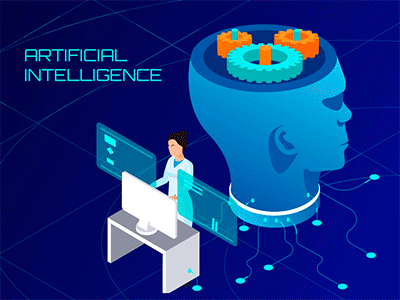Artificial Intelligence (AI) has become a game-changer in the business world. From small startups to multinational corporations, AI is transforming how companies operate, compete, and grow. But what exactly does AI do in business? How can organizations leverage AI to boost efficiency, enhance customer experience, and drive innovation?
In this article, we’ll dive deep into the role of AI in business — discussing its applications, benefits, challenges, and future prospects.
Key Takeaways 📌
- AI is revolutionizing business operations by automating repetitive tasks and providing intelligent insights.
- It improves decision-making through data analysis and predictive analytics.
- AI enhances customer experience via personalization and chatbots.
- Adoption of AI comes with challenges like data privacy, ethical concerns, and workforce impact.
- Businesses that embrace AI effectively can gain a significant competitive advantage.
What Is Artificial Intelligence in Business? 🤔
Artificial Intelligence refers to the simulation of human intelligence processes by machines, especially computer systems. These processes include learning (acquiring information), reasoning (using rules to reach conclusions), and self-correction. In a business context, AI means applying these technologies to automate processes, analyze vast amounts of data, and support decision-making.
Types of AI Used in Business
- Machine Learning (ML): Algorithms that improve automatically through experience and data.
- Natural Language Processing (NLP): Enables machines to understand and respond to human language.
- Computer Vision: Allows machines to interpret visual information.
- Robotic Process Automation (RPA): Automates routine tasks traditionally done by humans.
How Is AI Transforming Business Operations? 🏢
Automation of Routine Tasks
Many business processes involve repetitive tasks such as data entry, invoice processing, and customer queries. AI-powered tools like RPA bots can automate these tasks, freeing human workers for more strategic activities.
Enhanced Data Analytics
AI systems analyze massive datasets quickly and accurately. This allows companies to detect trends, forecast sales, optimize supply chains, and improve marketing strategies.
Personalization of Customer Experience
AI-driven recommendation engines, such as those used by Amazon and Netflix, tailor product suggestions to individual preferences, increasing customer engagement and sales.
Improved Decision-Making
AI provides actionable insights through predictive analytics and scenario modeling, helping managers make better decisions faster.
Risk Management and Fraud Detection
Banks and financial institutions use AI to detect suspicious activities, preventing fraud and ensuring compliance.
What Are the Benefits of AI in Business? 🌟
1. Increased Efficiency and Productivity
By automating mundane tasks, businesses can operate more efficiently, reduce errors, and save costs.
2. Enhanced Customer Service
Chatbots and virtual assistants provide 24/7 support, resolving customer issues quickly and improving satisfaction.
3. Better Market Insights
AI uncovers patterns in customer behavior, competitor analysis, and market trends that humans might miss.
4. Innovation Acceleration
AI helps businesses experiment with new ideas and products faster through simulations and data-driven insights.
5. Competitive Advantage
Companies that adopt AI early often gain a lead over competitors through smarter operations and superior customer experience.
What Challenges Does AI Present for Businesses? ⚠️
Data Privacy and Security
AI systems require large datasets, often containing sensitive information. Ensuring data protection and compliance with regulations like GDPR is crucial.
Ethical Concerns
Bias in AI algorithms can lead to unfair decisions, raising ethical questions about accountability and transparency.
Workforce Impact
Automation may replace certain jobs, requiring businesses to reskill employees and manage change effectively.
Implementation Costs
Deploying AI technology can involve significant upfront investment in infrastructure and talent.
Integration Issues
AI tools must be integrated with existing business systems, which can be complex and time-consuming.
How Can Businesses Successfully Implement AI? 🚀

Start with Clear Objectives
Define what business problems AI should solve and how success will be measured.
Invest in Quality Data
Ensure data is accurate, complete, and relevant for training AI models.
Build Cross-Functional Teams
Combine expertise from IT, data science, and business units for effective AI adoption.
Pilot and Scale Gradually
Test AI solutions on smaller projects before scaling across the organization.
Focus on Change Management
Communicate benefits, provide training, and address employee concerns proactively.
What Are Real-World Examples of AI in Business? 🌍
Retail
AI personalizes shopping experiences, optimizes inventory management, and improves supply chain logistics.
Finance
Fraud detection, credit scoring, and algorithmic trading rely heavily on AI.
Healthcare
AI aids in diagnostics, personalized treatment plans, and automating administrative tasks.
Manufacturing
Predictive maintenance and quality control use AI to reduce downtime and defects.
Marketing
Targeted advertising and sentiment analysis help companies connect with customers more effectively.
What Does the Future Hold for AI in Business? 🔮
AI is expected to continue evolving, becoming more intelligent, autonomous, and embedded across business functions. Emerging trends include:
- Explainable AI: Making AI decisions more transparent to build trust.
- AI and IoT Integration: Combining AI with connected devices for smarter operations.
- AI in Cybersecurity: Using AI to predict and prevent cyber threats.
- Human-AI Collaboration: Enhancing, not replacing, human creativity and judgment.
The companies that embrace these advances while addressing ethical and workforce challenges will thrive in the AI-driven future.
🤖 How Does AI Improve Customer Experience in Business?
AI has transformed the way businesses interact with their customers by providing faster, more personalized, and more efficient services. Through AI-powered chatbots and virtual assistants, companies can offer 24/7 customer support that instantly responds to queries, resolves common problems, and guides users through purchasing decisions. AI analyzes customer behavior patterns to deliver personalized product recommendations and marketing messages, improving customer satisfaction and loyalty. Moreover, sentiment analysis tools allow businesses to gauge customer emotions and feedback in real-time, enabling proactive service improvements. AI-driven personalization creates a seamless and engaging customer journey that not only increases conversion rates but also builds long-term brand affinity.
📈 How Can AI Drive Better Decision-Making in Business?
AI assists business leaders by providing actionable insights derived from vast volumes of data that would be impossible for humans to analyze manually. Predictive analytics powered by AI models can forecast market trends, customer demand, and financial outcomes with greater accuracy. This data-driven decision-making reduces risks and uncovers new opportunities for growth. Additionally, AI can simulate various scenarios and outcomes, helping executives weigh different strategies before committing resources. Integrating AI into business intelligence tools enables real-time monitoring of key performance indicators, allowing for agile and informed decisions that keep companies competitive in rapidly changing markets.
🏭 What Role Does AI Play in Manufacturing Efficiency?

In manufacturing, AI is revolutionizing operations by optimizing processes, reducing downtime, and improving product quality. Predictive maintenance systems use AI to analyze machine data and predict equipment failures before they occur, minimizing costly production stoppages. AI-powered robotics enhance precision and speed in assembly lines, increasing throughput while reducing errors. Additionally, AI algorithms optimize supply chain management by forecasting demand, managing inventory levels, and identifying bottlenecks. Quality control benefits from AI-driven computer vision systems that inspect products for defects with higher accuracy than human inspectors. Together, these advancements lead to significant cost savings and higher operational efficiency.
💼 How Is AI Transforming Human Resource Management?
AI is reshaping HR by streamlining recruitment, employee engagement, and performance management. Intelligent applicant tracking systems screen resumes and identify top candidates based on skills and experience, reducing hiring bias and time-to-fill positions. AI-driven chatbots assist in answering employee queries and onboarding newcomers, enhancing communication and support. Furthermore, AI analyzes workforce data to identify patterns in employee performance, retention risks, and training needs, enabling HR managers to make informed interventions. By automating routine administrative tasks, AI allows HR professionals to focus on strategic initiatives that drive organizational growth and employee satisfaction.
🛒 How Does AI Optimize Supply Chain Management?
Supply chains are complex networks that require coordination of suppliers, manufacturers, distributors, and retailers. AI enhances supply chain management by providing real-time visibility into inventory levels, shipment status, and demand fluctuations. Machine learning algorithms forecast demand more accurately, helping businesses maintain optimal stock levels and reduce waste. AI also supports supplier selection and risk management by analyzing historical data and market conditions. In logistics, AI optimizes routing and delivery schedules, reducing transportation costs and improving delivery speed. The end result is a more agile, resilient, and cost-efficient supply chain that better meets customer expectations.
💡 How Can Small Businesses Leverage AI Effectively?
While AI might seem like a tool only large Corporations can afford, small businesses can also benefit greatly by adopting AI-powered applications tailored to their needs. Cloud-based AI services offer affordable solutions for automating customer support, managing social media marketing, and analyzing sales data. Small businesses can use AI chatbots to engage customers round-the-clock, freeing up staff for more personalized service. AI-driven marketing platforms help target campaigns efficiently, increasing return on investment. Moreover, AI tools simplify financial management through automated bookkeeping and fraud detection. By embracing accessible AI technologies, small businesses can enhance productivity, improve customer satisfaction, and compete more effectively.
Also Read : Business Loan for Startup? Everything You Need to Know!
Conclusion
Artificial Intelligence is no longer a futuristic concept but a present-day reality transforming businesses worldwide. From automating mundane tasks to unlocking new insights and improving customer experiences, AI offers tremendous benefits. However, success requires thoughtful implementation, addressing ethical concerns, and investing in people.
Businesses that strategically adopt AI and integrate it into their core operations will gain significant competitive advantages and future-proof their growth. AI is not just a tool; it’s a catalyst for innovation and a new way of doing business.
FAQs
1. What types of businesses can benefit from AI?
Almost all industries can benefit from AI, including retail, finance, healthcare, manufacturing, and marketing.
2. How expensive is implementing AI in a business?
Costs vary widely depending on the scale and complexity but can include software, hardware, talent, and ongoing maintenance.
3. Will AI replace human jobs in businesses?
AI will automate some tasks but is more likely to augment human roles, requiring reskilling and collaboration.
4. How does AI improve customer service?
Through chatbots, personalized recommendations, and faster response times.
5. What are the biggest risks of using AI in business?
Data privacy breaches, algorithmic bias, and workforce displacement are key concerns.
6. How can small businesses start using AI?
By leveraging cloud-based AI tools and focusing on automating specific tasks like customer support or marketing analytics.
7. Is AI adoption more beneficial for large or small businesses?
Both can benefit, but large businesses may have more resources for complex AI systems, while small businesses can gain agility and efficiency from simpler AI solutions.
